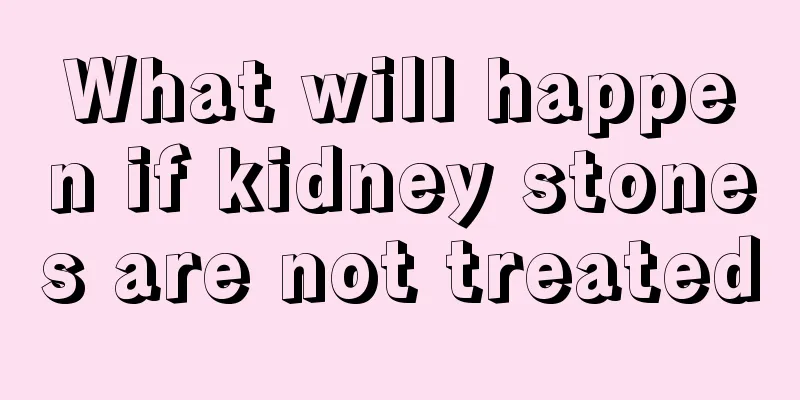What will happen if kidney stones are not treated

|
Patients with kidney stones certainly cannot ignore treatment, because not paying attention to treatment may lead to more adverse consequences, such as obstruction or urinary tract accumulation, or hematuria and symptoms such as low back pain and abdominal pain. 1. When kidney stones fall into the narrow part of the ureter, it can cause partial or complete blockage, leading to water accumulation in the urinary tract and even dilation of the renal pelvis, and cause symptoms such as pain, difficulty urinating, sudden interruption of urination, and urinary retention. 2. Hematuria often occurs after various physical activities. Hematuria can be divided into macroscopic hematuria, which means the red urine can be observed with the naked eye; and microscopic hematuria, which means the color change cannot be seen with the naked eye and the red blood cells in the urine can only be observed through a microscope. Therefore, when gout patients have a urine test and find a large number of red blood cells under the microscope, they should check for the presence of stones. In order to prevent kidney stones from becoming more serious, you can first use Depuchang's Shishi Tea to expel them. 3. About half of patients with long-term kidney stones will experience lower back and abdominal pain. In mild cases, there are symptoms such as dull pain, bloating, and dull pain; in severe cases, there are severe paroxysmal intermittent colic, some of which are like knife-like pain, mostly accompanied by radiation to the ipsilateral groin and perineum. A small number of patients also have reflex pain on the healthy side, which is lighter than the pain on the affected side. When the pain is severe, the patient often groans incessantly, tosses and turns restlessly, feels nauseous and vomits, becomes pale, sweats profusely, has a low blood pressure, and is in a state of collapse or shock. For a few patients, the pain can be relieved by itself after a few hours, but for most people, antispasmodics and analgesics are needed to stop the pain. If the stone falls into the bladder, in addition to pain, there will also be stone irritation symptoms such as urgency and frequency of urination. 4. If kidney stones cause hydronephrosis for too long, urination is blocked, and the area above the obstruction is under excessive pressure, kidney blood flow is reduced, renal tubular degeneration and necrosis may occur, and the kidneys may atrophy and shrink, resulting in decreased renal function or complete failure. 5. Urinary tract infection often occurs in patients with combined stones or secondary infections after stone surgery. It is most common in urethra and bladder inflammation, but can also occur in the renal pelvis and around the kidneys. |
<<: What kind of tea is jasmine tea
>>: Will kidney stones cause hematuria symptoms?
Recommend
Banana Honey Moisturizing Mask
We all know that bananas are a kind of tropical f...
What are the diagnostic methods for nasopharyngeal carcinoma?
Nasopharyngeal carcinoma is a common malignant tu...
How much does skin cancer treatment cost
Skin cancer refers to squamous cell carcinoma, ba...
The significance of preoperative radiotherapy for esophageal cancer
Preoperative radiotherapy is not routine for pati...
The rules of baseball
Baseball is very common. This sport is very helpf...
What's wrong with the itchy crotch
The symptoms of crotch itching are not so rare. T...
What foods are good for hair loss? What foods are helpful for hair care?
Hair is composed of protein, so protein supplemen...
Why do you need oxygen during pregnancy? Does hypoxia have any effect on the fetus?
In the middle and late stages of pregnancy, becau...
There is a lump next to the collarbone
Generally speaking, our cheeks are prone to acne ...
My stomach is always bloated
As we all know, there are many factors that affec...
Can genetic factors induce skin cancer?
Can cancer be inherited? This is something that m...
What is the reason for high direct bilirubin in the human body?
The human body may have high or low bilirubin lev...
What are the symptoms and causes of multiple gallbladder polyps?
Nowadays people's living standards are gettin...
How to wear contact lenses
Wearing contact lenses can help us correct our vi...
How to clean the oil on clothes
When clothes are stained with oil, it will give u...









